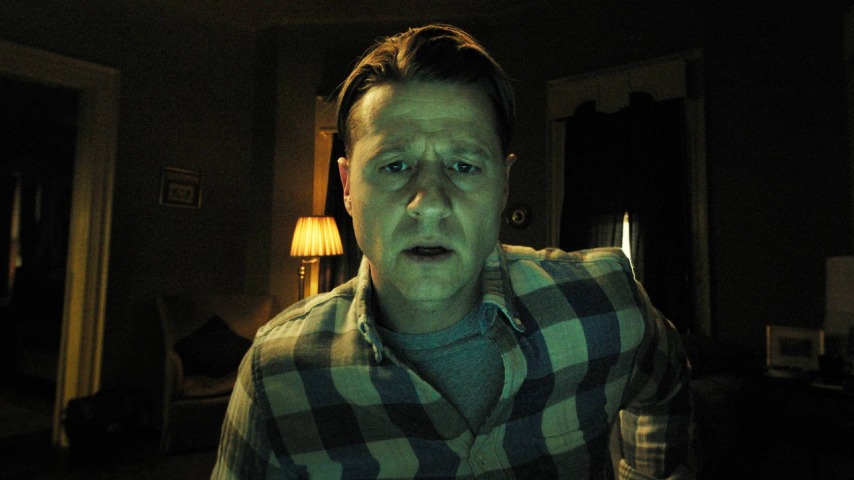The anxiety of failing as a parent and spouse festers into full-blown terror in Bloat, the feature debut of U.K.-born, Tokyo-based writer-director Pablo Absento. The plot unfolds entirely through a computer screen—involving FaceTime calls, Google searches, and an eclectic assortment of apps—which exacerbates the helplessness one man feels in the face of his far-off family’s escalating endangerment. Yet Bloat fails to innovate in a subgenre with some great (or at least beloved) predecessors, among them the Unfriended franchise as well as Rob Savage’s Host and Dashcam. Even more familiar is its obsession with idealizing the nuclear family. Patriarchs are presented as utmost protectors; white men, perhaps unintentionally, are uniquely portrayed as the only demographic with the gumption to step up and be true heroes.
Jack (Ben McKenzie), a prototypical family man, has been on leave from NATO military service in the wake of his wife, Hannah (Bojana Novakovic), delivering a stillborn child (this grueling moment is, of course, a readily accessible file on Jack’s large Mac desktop). Already the parents of two towheaded young boys, adolescent Steve (Malcolm Fuller) and slightly younger Kyle (Sawyer Jones), the couple resolve to take an impromptu family vacation to Japan in order to restore some harmony after an intense mourning period. But when a vague militia group bombs U.S. bases in Syria and Iraq, Jack is forced to return to duty, leaving the trip in limbo. Ironically, he serves as a drone strike operator, meaning that viewers see him toggle between executing alleged enemies of the state and adding items to his cart on Amazon.
Despite Jack’s absence, the rest of the family decides to embark on the long journey themselves, lest the pricey flights and accommodations go unused. Though originally presented as visiting Tokyo, Hannah constantly describes them as being in “the Japanese countryside,” which through brief glimpses actually appears to be more of a bustling suburb. Shortly into their vacation, Kyle nearly drowns in the lake near their rental. Deeply stressed over his inability to physically be there, Jack enlists the help of his goofy Army buddy Ryan (Kane Kosugi), whose technical knowhow and Japanese heritage allow him to quickly sift through local Instagram posts and find footage of Kyle’s accident. After observing green sludge seeping from his son’s mouth moments after revival, Jack grows concerned, a feeling that’s compounded by the child’s increasingly bizarre behavior.
Hannah’s parenting skills plummet in direct correlation with her rising appetite for wine (“I’m just so overwhelmed…I can’t lose another child,” she plainly texts). As a result, Jack enlists Steve’s help to set up cameras around the property, allowing him to oversee as much as possible from afar. Strange phenomena are either caught or distorted by these cameras, and Jack’s internet sleuthing eventually points to an ancient creature from local folklore that might be to blame for everything. His suspicions are strangely confirmed by the case of Derrick Gray (Royce Johnson), a ex-Marine whose son supposedly came down with a similar affliction while they were residing in Japan. However, the boy’s shocking death landed Derrick behind bars for life. “A father’s duty is to protect, even if it means confronting the shadows by fire,” he’s quoted in an article Jack peruses. This echoes Hannah’s earlier demands for Jack to “be the father” and provide guidance from another continent. If Bloat believes anything, it’s that fathers are—must be—guardians. If they do ever act violently, it’s to “kill the evil” that threatens the sanctity of their homes.
Absento has very limited sympathy for Hannah in her script. Over the 11 days of this vacation from hell, it’s as if the family completely crumbles without Jack’s presence, a strange development considering his travel-focused line of work that must regularly result in extended departures. The recent loss of their newborn daughter coupled with Kyle’s medical and behavioral issues certainly compounds Hannah’s grief, but why is her character devoid of strength while Jack’s only amplifies? Sure, the stereotype for soldiers is one of selfless perseverance—then again, the same can be said for mothers. Horror films have often relished in the evil that manifests in single-mother households. The Exorcist and Carrie are prime examples, and recent entries like The Babadook and Relic have incorporated a concerted feminist slant into that narrative. The same can’t be said for Bloat; without a man around, everything crumbles.
Bloat’s biggest scare comes from a YouTube screamer video, while the rest of the film’s horror hinges on pixelated “glitches” and blurry trail-cam screengrabs. The central monster isn’t really developed in a visual sense, making it an odd choice for Absento to fixate on. Even when Ryan visits a Japanese monk, he scratches his head at the fact that these creatures aren’t known to flat-out possess children, but rather are notorious for drowning them. Why, then, would the filmmaker not choose one of Japan’s litany of eligible spirits or render the film a more straightforward creature feature? Though it’s clear that Bloat is riffing on the digital ghosts of Ringu and Pulse, this approach doesn’t mesh with the mythology it attempts to flesh out for itself.
But it’s unfair to say that the film is completely devoid of commentary. Jack grapples with professional disillusionment alongside his own vices and definitely displays moments of weakness (frankly, McKenzie carries the entire film, perhaps unsurprising to fans of The O.C.). But Bloat’s lackluster ending appears to solidify its simplistic stance of fathers being the ultimate figures of familial fealty, whether or not their status as “savior” is wholly correct. It’d be easier to buy the fact that Absento was aware of the connotations of her work if the film ever subverted these tropes instead of shamelessly employing them.
Director: Pablo Absento
Writer: Pablo Absento
Starring: Ben McKenzie, Bojana Novakovic, Sawyer Jones
Release Date: March 7, 2025









































